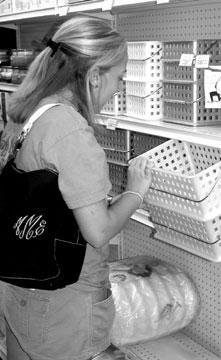Moving on campus can be difficult for some students, but being prepared for “the big move” can make any dorm experience a little less frightening.
“[Students] are moving into their brand new homes,” Residential Life Communications Director Mimi LaValle said. “They need to know everything about living on campus.”
Lavalle said each residence hall has individual floor meetings during the first week of school to prepare students.
She said during these meetings, resident advisers inform students of what they need to know about living in residence halls.
Lavalle also said residential advisers tell students what they can and cannot have in the dorms, where they can go for study groups and other things essential to their dorm living experience.
LaValle said Residential Life provides incoming residents with a handbook for living in the dorms.
According to the handbook, students should pack extra hangers, a first aid kit, an area rug and an extension cord with a surge protector.
LaValle also said students should bring a desk lamp because personal lighting is important when a student is studying late into the night.
The Residential Life Web site said when packing, students also should consider bringing along a mattress pad, electric fan, laundry bag and an iron.
LaValle also said residents should bring a can opener, data
connection for a computer, shower caddy and a sewing kit to repair loose buttons or holes.
Harvey Jones, a biology sophomore, said students should have directions to nearby stores in case they need to buy things they forgot to pack.
For new residences, Princeton Review has compiled a list of twenty essential items all dorm bound college students need to survive.
Jones said shower shoes, which Princeton Review refers to as fungicide, are the most important things any student should bring.
“There are so many germs in the shower,” Jones said. “You can catch anything.”
While custodians are responsible for cleaning bathrooms and
outside hallways, few students are prepared to clean their own rooms.
Jeff Corbin, a political science sophomore, said when living with a stranger, differences about what is considered clean can emerge.
Corbin said it is important for students to have their own
cleaning supplies.
Mario Jefferson, an English junior, said disinfectant is important for anyone living with a messy roommate, but students should have a broom and a mop.
“The floors are always dusty,” Jefferson said.
According to Princeton Review, small handheld vacuum cleaners are necessary for picking up popcorn kernels, dirt and pencil shavings that might happen to end up on the floor.
LaValle said students should bring cleaning supplies, but they should not bring anything with a strong odor or something that will damage furniture.
According to the Princeton Review list, having storage units such as milk crates are essential when room space is limited.
Students can store extra items like shoes, books, papers and compact discs.
Marketing sophomore Erin Yokum said plastic storage
containers can be used to store socks and underwear.
Despite Residential Life’s efforts to successfully match roommates, residents should prepare themselves for whatever annoying habits their roommates will possess.
Princeton Review said all residents should have some sort
of barrier to separate them from their roommates’ habits.
Students should have ear plugs or a portable CD player with headphones to shield themselves against roommates who frequently have screaming telephone fights with their significant others, according to Princeton Review.
Ear plugs and headphones also are useful barriers against snoring and a roommate’s “questionable musical taste.”
Besides warding off any undesired noise, Jefferson said incoming residents should be prepared to fight any unwelcome critters invading their dorm room.
“Ants are all through McVoy,” Jefferson said.
He said bug spray is a necessity.
Movin’ on up: How to pack for dorm life
August 21, 2003

Movin’ on up




